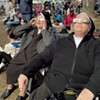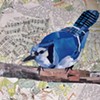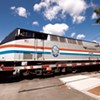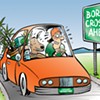Published September 14, 2005 at 3:27 p.m.
Bill and JoAnn Boyce like to travel, but for years they stuck close to home. It wasn't that they couldn't afford to take trips; the retired Underhill residents had a hard time getting out because of JoAnn's multiple sclerosis. Diagnosed in 1982, the affable homemaker can no longer walk; she gets around in a motorized wheelchair.
Staying home was particularly hard for her energetic husband, an avid outdoorsman; the couple's basement is filled with mounted antlers and turkey beards. A bearskin hangs on the wall.
One day in March 2001, shortly after Bill retired from his job as a manager at IBM, he and JoAnn drove to a recreational vehicle showroom in Montpelier. They got the idea to buy an RV from John and Ramona LaBrie, another couple in their MS support group, who raved about theirs. The Boyces found a salesman, and explained their situation. "I told him, 'We haven't been anywhere in five years because of accessibility issues,'" Bill recalls.
He asked the salesman if he might be able to locate a model like the one his friends had, a 34-foot Bounder with a walk-through bathroom, which could be modified to suit JoAnn's needs. Coincidentally, only two hours earlier the salesman had accepted on consignment an identical vehicle, complete with all the modifications they were seeking.
"We bought it that April," says Bill, "and we've been traveling ever since." A colorful U.S. map in the RV's kitchen shows they've been to 28 states. "And," he adds, "Alberta and British Columbia."
This month, the Boyces will drive their RV to the annual national rally of the Handicapped Travel Club. They won't have to go far -- along with the LaBries, they are the "Wagon Masters" for this year's event, to be held September 28 to October 2 at Lone Pine Campsites in Colchester. Disabled campers, their families and caregivers will gather from all over the country to swap stories, trade tips, and enjoy each other's company; the club's motto is "for fun and fellowship." JoAnn Boyce looks forward to the wheelchair races, though she won't be competing. "No, not me, no thank you," she quips. "I just watch 'em. They go crazy."
Advocacy isn't officially on the agenda, but rally participants will also be drawing attention to the issue of campground accessibility. "I think we do that just by being there," Bill notes.
He and his wife are among the HTC's 250 members. Five disabled couples from California and Texas founded the club in 1973. According to the HTC website -- http://www.handicappedtravelclub.com -- "These couples had received so much therapy from travel and the association with campers with disabilities, they decided to form a club which would encourage other handicapped people to travel, to meet, and to exchange ideas."
Today, its members are mostly RV- or camper-owning couples, who pay $10 to join and $8 in annual dues. In return, they receive a quarterly newsletter, and are invited to RV rallies all over the country. Last year's gathering was in Toppenish, Wash- ington; next year's is scheduled for Sullivan, Indiana.
Boyce reports that he's registered 19 RVs for the Vermont rally; three others, all from Texas, cancelled their plans to come on account of Hurri- cane Katrina. Boyce admits that if the rally were on the West Coast this year, he and JoAnn probably wouldn't have made it. Gas prices are pretty high, he says -- his Bounder gets just seven miles per gallon. And they'd really be stuck if there were suddenly a shortage.
Though it's not exactly fuel-efficient, Boyce's late-'80s model RV is clearly a prized possession. It's parked beside the couple's modest home on a rural dirt road.
Boyce points out the ways in which it differs from a standard RV. First there's the chair lift -- JoAnn can't climb into the vehicle, so before a trip, Boyce must retrieve the components of the lift from compartments on either side of the vehicle's door. He fixes it in place and sits down to demonstrate, raising himself with a red, hand-held controller. "I put her in the chair, she goes up," he explains.
Once JoAnn's inside, Bill can help her into the passenger's chair, which has been altered so that it swivels back to face the cabin. The cabin itself is fairly roomy -- one of the chairs was repositioned to provide additional space, and one of the beds was removed. JoAnn's wheelchair fits easily at the table.
Boyce also moved their bed, to make it easier for JoAnn to get in and out. And he notes that the bathroom has been modified as well. The shower contains a large metal and plastic bench. There are metal railings around the toilet.
Boyce observes that these accommodations are similar to what they might find in a hotel room. But JoAnn says staying in an RV is "better than a hotel."
Says Bill, "Although many hotels have got accessible rooms, every one is different." This is a problem, since his wife suffers from cognitive loss, which means she can become confused when confronted with a changing environment. "With the motor home, once she gets used to how she's doing it, it's the same across the country," he notes. "She feels at home. She feels safe, like she does in her own house."
Having an accessible bathroom inside the RV is a necessity. Despite the requirements laid out in the Americans with Disabilities Act, many campgrounds still present barriers to wheelchair users. Just 73 of Vermont's 111 campgrounds offer at least partly accessible facilities; only nine of those define themselves as "fully accessible." Maurice Barnes of the Vermont Campground Association, and long-time owner of Lakeside Camping in Island Pond, calls Vermont campgrounds' efforts "mediocre."
Bill Boyce shares that sentiment. "Vermont doesn't have a lot of RV places that are accessible, as compared to other states," he says. There isn't a single Vermont campground on the HTC list of recommended sites, though that may be because HTC members don't travel much in the state. Sites get added to the list when HTC members who have stayed at a site fill out a worksheet on the group's website.
The reviewers look for large, level sites, and hook ups on solid ground -- sand or crushed rock can be treacherous in a wheelchair. They want to see ramps and doors wide enough to fit wheelchairs leading into camp facilities. Since not all HTCers have baths aboard their RVs, they also look for accessible rest rooms. Showers, say the group's guidelines, shouldn't have steps or curbs, and fixtures should be within reach for someone who's seated.
The HTC realizes these modifications can be costly. They offer tips to campground owners on the website. "One consideration is to not redo existing bathrooms," they suggest, "but to build one toilet/shower room to be used by both sexes."
The first campground where Boyce had booked the rally probably won't make the HTC list. He declines to name names, but says the owner told him it would meet his specifications. When he visited in the spring, however, he discovered otherwise. "Getting into the washrooms, there was a four-inch lip," he says, exasperated. And the sole path to their meeting site was covered in gravel. "You wouldn't dare take a powered scooter down there," he says. "Somebody would go over."
Lone Pine Campsites might make it, though. Boyce praises their facilities, particularly its bathrooms. "They're probably as nice as I've seen anywhere," he says.
But even Lone Pine isn't perfect. A cursory walk-through reveals a two-inch lip on the laundry room's only door. And some of the hookups at the sites the HTC will use aren't on level ground.
According to Lone Pine camp-store manager Jonica King, the handicapped campers who visit often express their gratitude that some facilities are accessible. She says they don't get many, and they've certainly never had such a large group of disabled campers before.
HTC newsletter editor and webmaster Arnie Pike insists there's strength in numbers. Pike, who lives in Placentia, California, uses a wheelchair as a result of a stroke he suffered six years ago. He won't be attending the Vermont rally, but says he's interested in this year's agenda -- the club will likely vote to amend its bylaws, officially broadening its membership to include handicapped travelers who don't own RVs.
Pike doesn't have one. The retired event planner uses a modified van instead. He travels in it often, sometimes with his able-bodied wife, sometimes alone. "Wherever I go," he says, "I look out for things that are not right, as far as ADA." Pike recently complained to Amtrak because he was forced to spend an entire trip in a dim, windowless area near the baggage. They sent him a refund, and two travel vouchers.
He would like to see the HTC expand beyond campgrounds, to include all kinds of travel. "I would like to see us go in groups," he says, "and demand that whatever trip we take is handicap accessible." As a group, he says, "we'll have more clout."
Though it departs somewhat from the club's original mission, that kind of thinking is certainly compatible with HTC's fundamental philosophy, which is expressed in the acronym G.O.A.L. It appears on their website, and on the back of HTC t-shirts. It stands for, "Get Out And Live."
More By This Author
Speaking of...
-

Video: Gail and George Africa of Vermont Flower Farm Plan to Retire
Sep 8, 2022 -

Under New Ownership, Turtle Fur Plans to Expand Its Offerings
Aug 1, 2022 -

Vermont Considers Paying Parent Caregivers of Adults With Disabilities
Apr 27, 2022 -

With School Masking Guidance Lifted, Families With Medically Fragile Kids Feel Forgotten
Mar 23, 2022 -

Dog Biscuit Bakery Andy’s Dandys Builds an Inclusive Workplace
Aug 10, 2021 - More »
Comments
Comments are closed.
From 2014-2020, Seven Days allowed readers to comment on all stories posted on our website. While we've appreciated the suggestions and insights, right now Seven Days is prioritizing our core mission — producing high-quality, responsible local journalism — over moderating online debates between readers.
To criticize, correct or praise our reporting, please send us a letter to the editor or send us a tip. We’ll check it out and report the results.
Online comments may return when we have better tech tools for managing them. Thanks for reading.














































